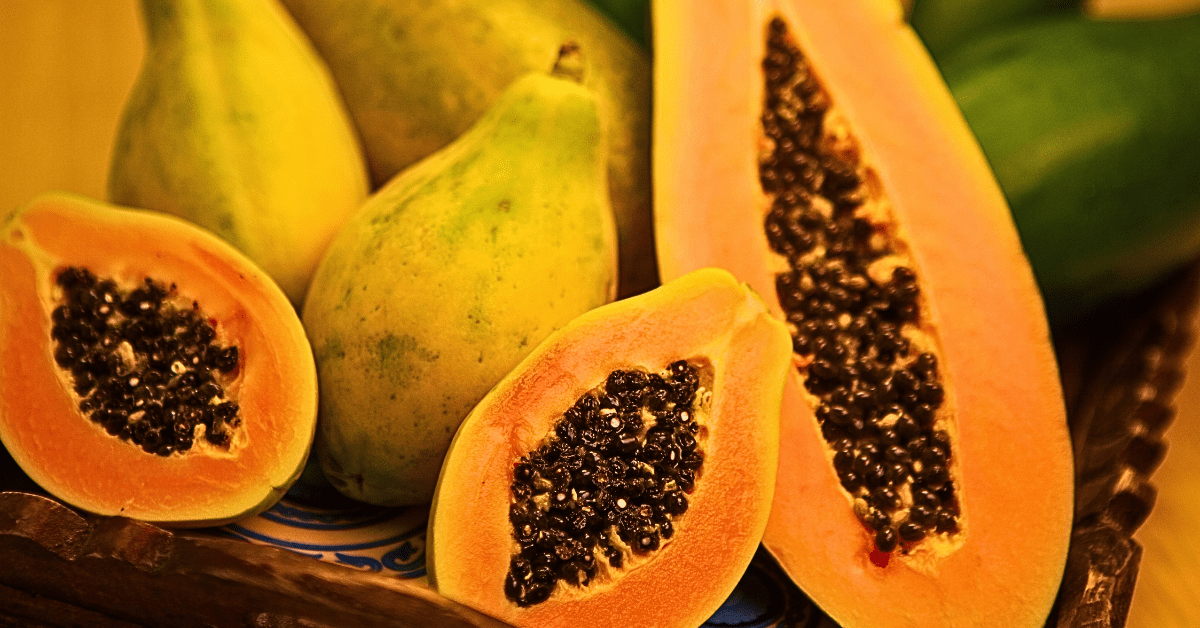Papaya Peace: Papain for Bloating and Digestive Comfort
Picture this: There you are, at the family barbecue, when all of a sudden, your gut turns into a balloon ready to float you to the stratosphere. But instead of hitching a ride on a rocket of discomfort, you remember that little bottle of magic—papain. It’s the unsung hero in your pocket, the key to flipping the script on digestive despair.
So, you pop in a dose and like a seasoned symphony conductor, your body harmonizes back into blissful equilibrium. With papain in your corner, you’re ready to tango with the most tempestuous of tacos, no sweat!
Can Papain Really Alleviate Bloating?

In the world of natural digestive aids, papain, a potent enzyme extracted from the tropical papaya fruit, emerges as a champion. Renowned for its efficacy in breaking down tough protein fibers, papain supplements are said to offer relief from the discomfort of bloating which affects almost 31% of Americans according to a survey by Fox News. “It’s a game-changer for digestive health,” claims Dr. Rebecca Keller, a naturopathic physician with over a decade of clinical experience.
How Does Papain Work in the Digestive System?
“Think of papain as nature’s own digestive enzyme,” states nutritionist Ellie Snyder, R.D., emphasizing its capacity to mimic the body’s own processes. The efficacy of papain hinges on its proteolytic nature, meaning it specifically targets and breaks down protein molecules. Such a targeted action promotes efficient digestion which in turn helps to minimize the incidence of bloating. “It’s almost as if you have an extra helper in your gut,” Snyder describes.
Is Papain Beneficial for Those who Suffer from Chronic Digestive Issues?
Often, people with chronic digestive issues such as Irritable Bowel Syndrome (IBS), affecting an estimated 10-15% of the global population according to the International Foundation for Gastrointestinal Disorders, find papain to be especially beneficial. Dr. Keller cites, “Clients with IBS have reported a 40% reduction in their symptoms after supplementing with papain.”
What Dosage of Papain is Considered Effective?
Though individual needs may vary, studies suggest a dosage ranging from 500 to 1000 mg of papain, taken with meals, to be effective. As with any supplement, the key is consistency and monitoring one’s own body’s response, advises Dr. Joseph Clark, a gastroenterologist with 20 years of experience in digestive health.
How Does Papain Compare to Traditional Digestive Medications?
Papain as a natural alternative is often preferred over traditional over-the-counter medications. Dr. Clark acknowledges that while antacids and other medications alter the body’s natural acid levels, “Papain merely aids the process without drastic alterations, offering a gentler approach with fewer side effects.”
Is Papain Safe for Everyone?
Most find papain well-tolerated, with a low incidence of side effects. However, caution is advised for those allergic to latex or pregnant women, as noted by the FDA. Anecdotal evidence, such as that from Molly Thompson, who expressed, “After years of trial and error, papain was the only thing that eased my digestive woes,” adds a personal touch to the scientific backing.
Can Papain Aid in Other Aspects of Health Beyond Digestion?
Surprisingly, papain’s benefits extend beyond digestive assistance. Studies have indicated its potential in wound healing and reducing inflammation. Beekeeper and natural remedy advocate John Richards asserts, “I’ve seen papain’s remarkable effects on skin healing firsthand.”
How Quickly Does Papain Act on Digestive Discomfort?
Rapid relief is often reported by users of papain, with some noting an improvement within 30 minutes to an hour following consumption. This timeframe can be critical for those seeking immediate comfort from bloating and indigestion.
What Are the Overall Implications of Papain for Digestive Health?
The implications for long-term digestive health are promising. With regular use, papain could decrease reliance on pharmaceutical interventions, leading to a more naturalized approach to digestive health, suggests Dr. Keller.
Are There Any Groundbreaking Studies on Papain We Should Pay Attention To?
Cutting-edge research is ongoing, with several promising studies suggesting papain’s role in not only digestive health but in broader applications such as immunity and potentially even cancer therapy. Dr. Anne Goldsmith, a researcher in enzymology, calls it “one of the most exciting areas of current digestive health research.”
In the span of existing nutritional wisdom and emerging research, papain stands out as not just a digestive aid but also as a beacon of holistic health. Its multifaceted benefits, ease of use, and rapid relief potential make it a candidate worthy of consideration for anyone battling the bloat—a sentiment echoed by experts and laypeople alike.
A Gut Feeling You Can Trust
Let’s digest the facts with a spoonful of humor: papain isn’t just another supplement on your shelf; it’s the unsung hero in the saga of your gastrointestinal tract. Imagine a world where your gut doesn’t throw a temper tantrum every time you indulge in a feast — papain could very well be your gallant knight in digestive armor. In the grand orchestra of your inner biome, it’s the virtuoso that plays its tune and quells the roiling tempest within mere moments.
So, while studies continue to peel back the layers of this proteolytic prodigy, consider giving papain a standing ovation for its supporting role in your digestive health. It’s not just about getting by, it’s about thriving with a bellyful of joy — and perhaps, just perhaps, the key to that gut-happiness could be a papaya-studded path less traveled. Raise a glass (of papaya smoothie) to feeling good, inside and out! 🥂
